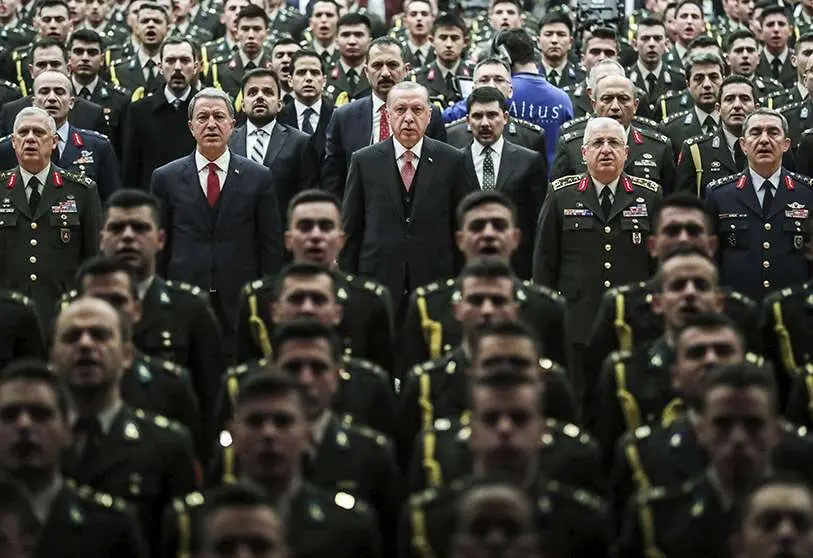Erdogan's purge claims 21,000 military commanders expelled from Turkish armed forces

The 2016 coup attempt led Erdogan to believe that part of the administration was manoeuvring against him. Hence, after the failed coup, the Ottoman leader launched a crusade against anyone in the institutions suspected of sympathising or having participated in the conspiracy against him. Army cadres have so far been the hardest hit. A total of 21,000 military commanders have been expelled from the armed forces for their alleged links to the FETÖ organisation, accused of leading the coup. In many cases, these links have not even been proven by the judiciary.
This was announced by Recep Tayyip Erdogan himself on Monday during the graduation ceremony of the Army War College in Ankara. In his speech, the Turkish president claimed that all those expelled were connected to the "terrorist organisation" of Fethullah Gülen, the cleric who heads the Gülen Movement and who is also the mastermind of the coup d'état. Erdogan revealed that 4,723 military personnel are still in prison for involvement in the plot and 3,560 are under judicial investigation. "After the coup, we made comprehensive reforms, including in educational institutions. We also closed all schools contaminated with this ideology," he said.

The president praised the "successful" institutional transformation undertaken after the coup and executed mainly within the armed forces, claiming that no other country in the world has been subjected to a similar "upheaval". "Turkey witnessed the most heinous and dangerous coup attempt in our history five years ago, but together we defeated it," Erdogan said. However, the purge in the army is part of a broader strategy that has eliminated more than 170,000 public sector posts by presidential decree. Erdogan himself has personally issued them.
The leader of the main opposition party, Kemal Kılıçdaroğlu, has spoken out against this practice. The chairman of the Republican People's Party (CHC) called the emergency decree laws that allowed for the dismissal of the civil service "illegal", while pledging to reinstate all those expelled and to retry those facing prosecution if he comes to power. In this scenario of apparent weakness for Erdogan, the CHC is demanding early elections, a request flatly rejected by the president and his government partner, Devlet Bahçeli, leader of the far-right Nationalist Action Party.

The head of the Justice and Development Party (AKP), which has been in power since 2014, accuses the FETÖ of extending its tentacles into all branches of the state and creating a parallel order with the sole aim of overthrowing him. He also accuses the movement and its leader, the cleric Fethullah Gülen, of orchestrating the plan allegedly executed in July 2016. An accusation he has consistently denied. Many have pointed out, however, that it was a self-coup capable of justifying the purge of Turkish state institutions, as Erdogan made the most of the occasion by intervening in various areas, such as the judiciary, the education system and religious affairs, to remove those who did not agree with his views.
In turn, the cleric's movement has accused President Erdogan of being involved in corruption schemes and favouring armed jihadist groups operating in the region. These accusations have tarnished the president's reputation and have allegedly fuelled the persecution of the group. The FETÖ leader, a spiritual guide and figure close to Erdogan in the past, currently resides in the state of Pennsylvania and has dual citizenship. The US authorities have declined to facilitate his deportation to Turkey following multiple requests from Ankara.

The failed coup, which killed 251 people, led to the dismissal of 16,500 war college students. They had not even graduated and were therefore not officially part of the army's ranks. Erdogan considered all of them FETÖ sympathisers. In this regard, the Turkish president declared during the graduation that a total of 1,452 students, 1,351 Turks and 101 foreigners, would complete their studies at the military academy and join the armed forces.
Beset by Turkey's multiple crises, the Turkish leader has claimed a series of political victories. Erdogan launched a structural revolution of the military in 2018 with the aim of modernising the operational set-up and improving the resources of the armed forces. This series of changes were tested on the ground and allowed Ankara to intervene in regional affairs through hard power. So much so that, to a large extent, the reforms enabled Erdogan to fulfil his expansionist agenda. However, Turkey's glory days are over. The country is in the midst of a deep political, economic and social crisis that is weighing on the country's regional and international role.








